高中英语人教版必修一Unit 1 Friendship Learning about Language课件(29张)
文档属性
| 名称 | 高中英语人教版必修一Unit 1 Friendship Learning about Language课件(29张) | 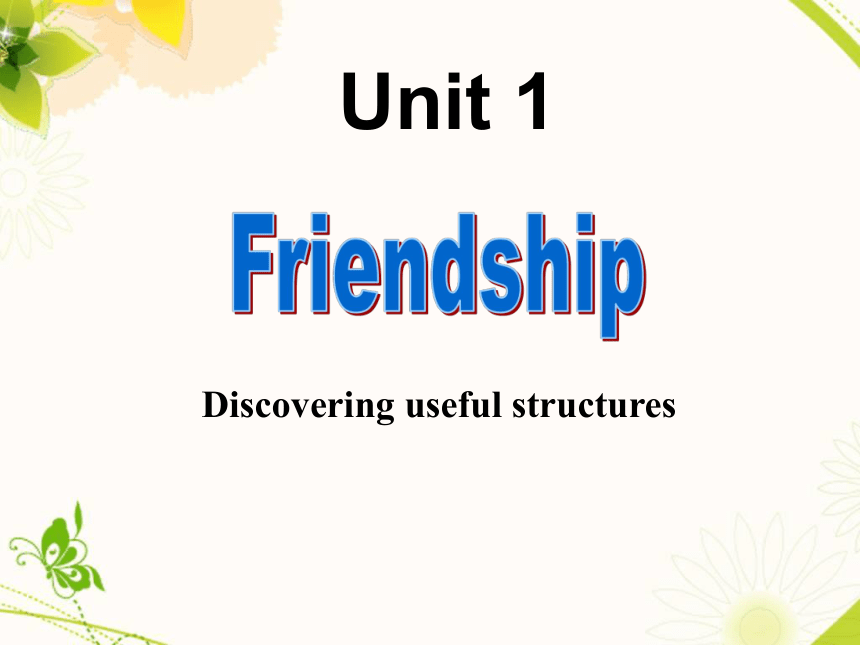 | |
| 格式 | zip | ||
| 文件大小 | 231.4KB | ||
| 资源类型 | 教案 | ||
| 版本资源 | 人教版(新课程标准) | ||
| 科目 | 英语 | ||
| 更新时间 | 2018-08-19 21:25:16 | ||
图片预览

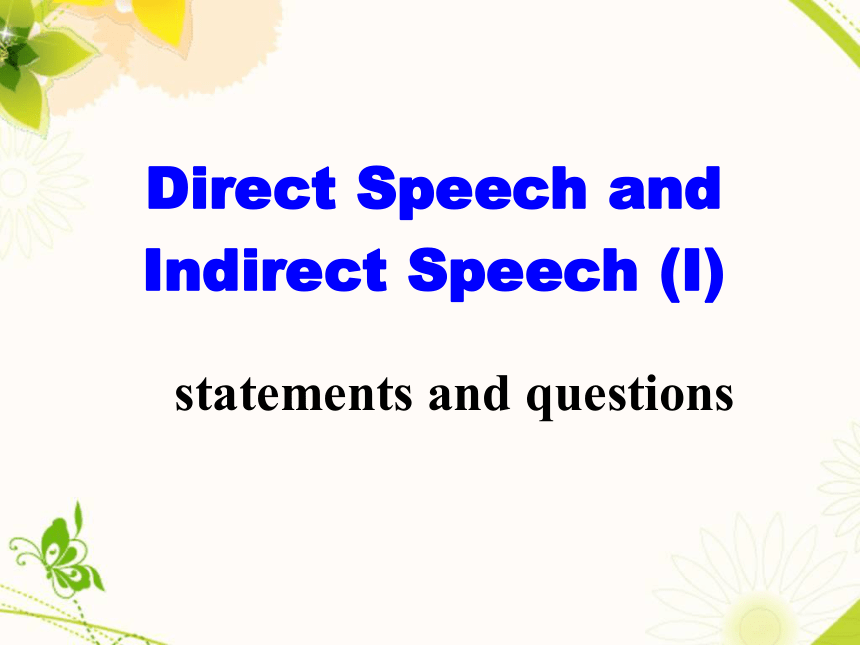

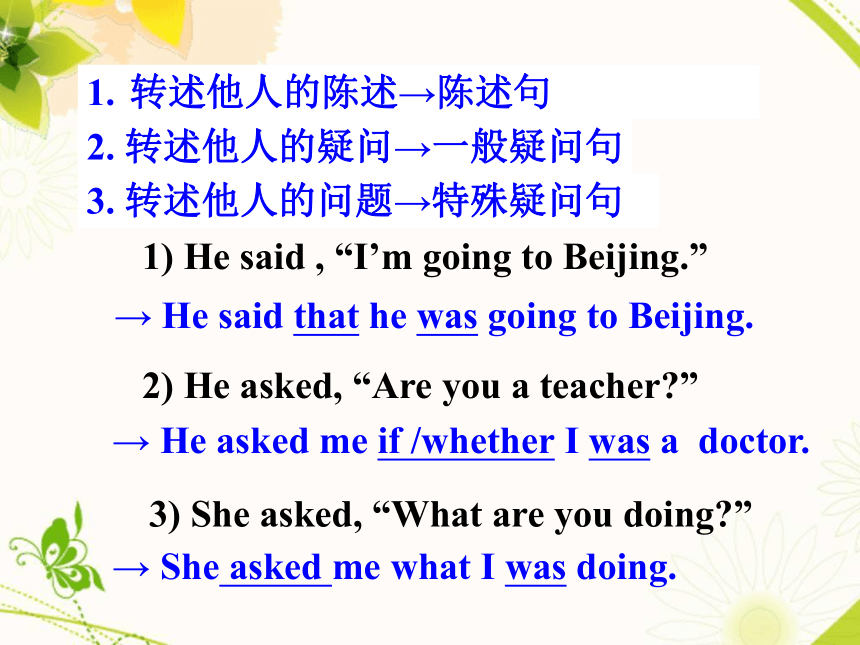
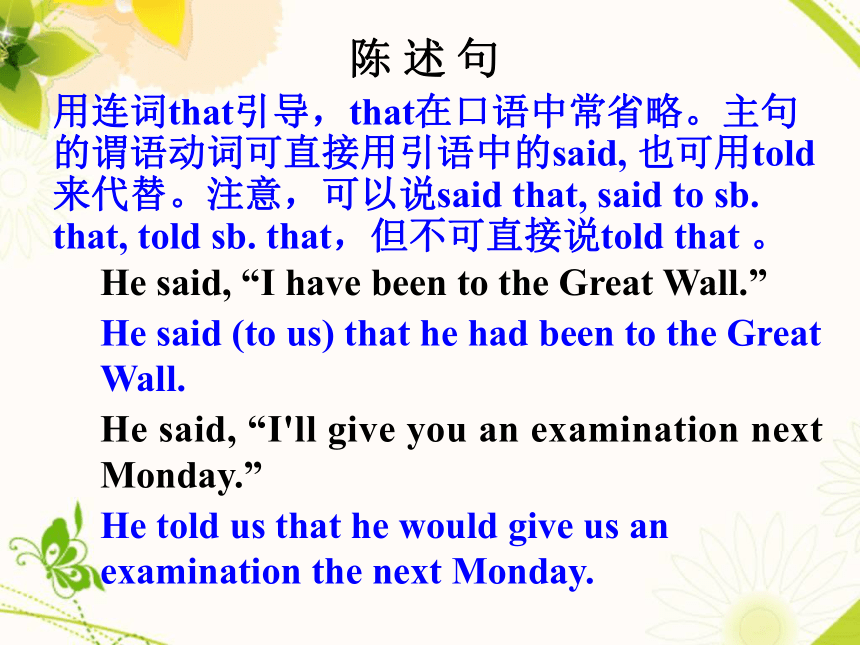
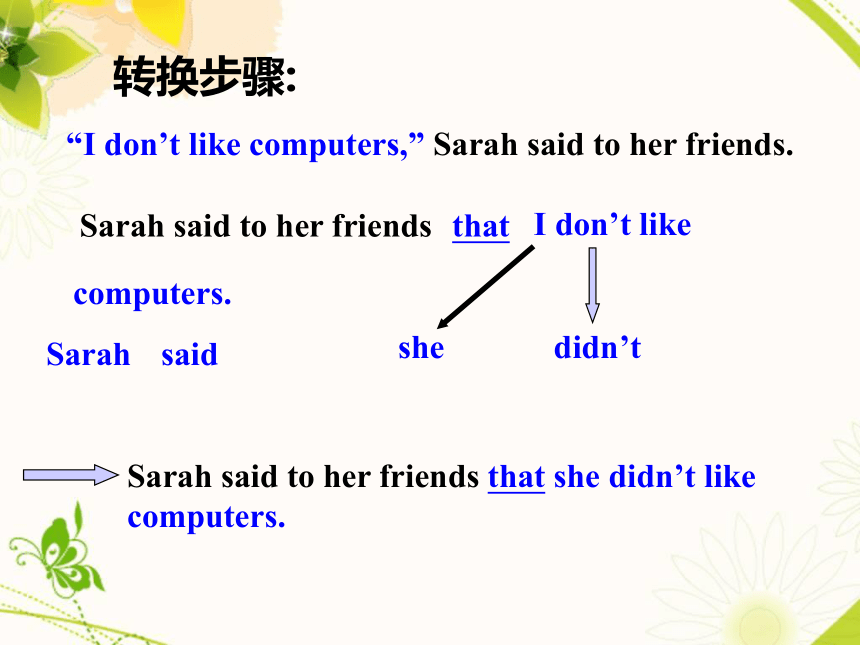
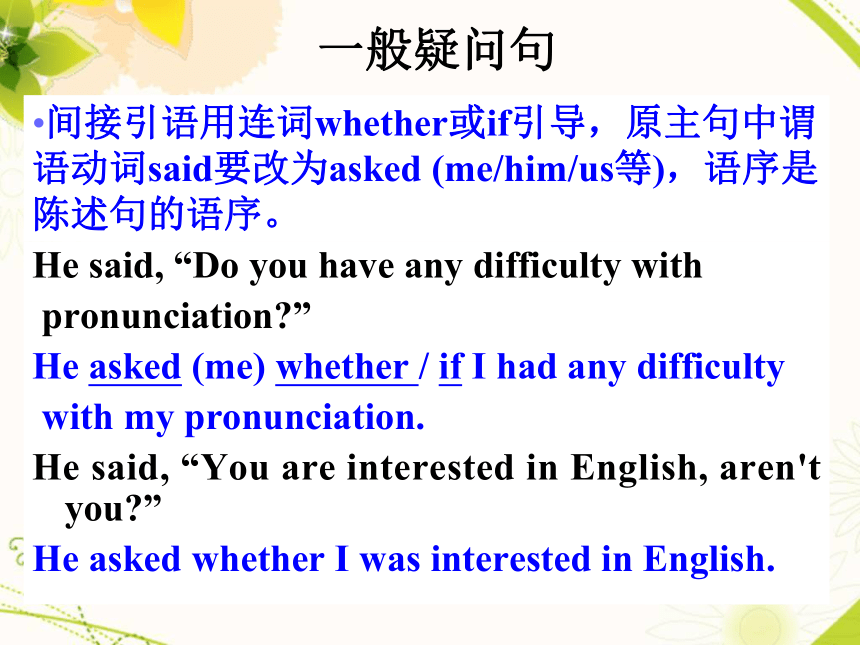
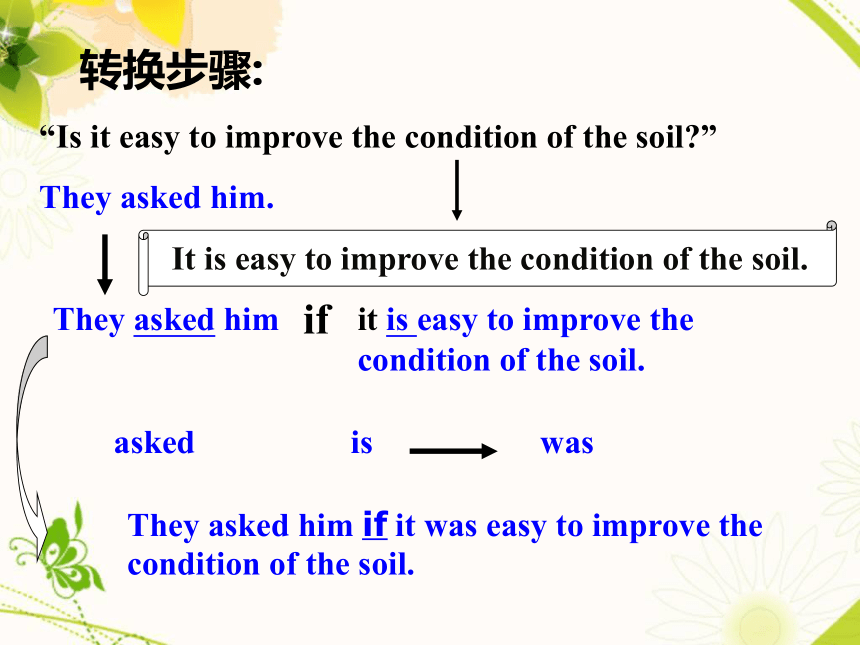

文档简介
课件29张PPT。Unit 1Discovering useful structuresFriendshipDirect Speech and
Indirect Speech (I)statements and questions直接引用别人的原话,两边用引号“”标出,叫做直接引语;用自己的语言转述别人的话,不需要引号这叫做间接引语。
直接引语为陈述句、一般疑问句、特殊疑问句和祈使句时,转换为间接引语时, 在句子的结构、人称、时态、时间状语和地点状语等方面都有变化。 转述他人的陈述→陈述句→ She asked me what I was doing.1) He said , “I’m going to Beijing.”→ He said that he was going to Beijing.2) He asked, “Are you a teacher?”→ He asked me if /whether I was a doctor.3) She asked, “What are you doing?”2. 转述他人的疑问→一般疑问句3. 转述他人的问题→特殊疑问句 陈 述 句
用连词that引导,that在口语中常省略。主句的谓语动词可直接用引语中的said, 也可用told来代替。注意,可以说said that, said to sb. that, told sb. that,但不可直接说told that 。He said, “I have been to the Great Wall.”
He said (to us) that he had been to the Great Wall.
He said, “I'll give you an examination next Monday.”
He told us that he would give us an examination the next Monday. 转换步骤:“I don’t like computers,” Sarah said to her friends.Sarah said to her friendsthat saiddidn’tsheSarah said to her friends that she didn’t like computers.Sarah一般疑问句 He said, “Do you have any difficulty with
pronunciation?”
He asked (me) whether / if I had any difficulty
with my pronunciation.
He said, “You are interested in English, aren't you?”
He asked whether I was interested in English. 间接引语用连词whether或if引导,原主句中谓语动词said要改为asked (me/him/us等),语序是陈述句的语序。
“Is it easy to improve the condition of the soil?”
They asked him.They asked himifIt is easy to improve the condition of the soil.it is easy to improve the condition of the soil.askediswasThey asked him if it was easy to improve the condition of the soil.转换步骤:特殊疑问句 He said to me, “What's your name?”
He asked me what my name was.
He asked us, “How many car factories have
been built in your country?”
He asked us how many car factories had been built in our country. 原来的疑问词作为间接引语的连词,主句的谓语动词用ask (sb. )来表达,语序改为陈述句语序 When do you harvest the wheat ?
( They asked him )They asked himwhenyou harvest the wheatyou harvest the wheat.heharvestedThey asked him when he harvested the wheat.转换步骤:选择疑问句 He asked, “Do you speak English or French?”
He asked me whether I spoke English or
French.
I asked, “Will you take bus or take train?”
I asked him whether he would take bus or take train. 用whether…or…表达,而不用if…or…,也不用either…or… 5. 注意地点的变化在直接引语变为间接引语时需要注意的变化1. 注意时态的变化2. 注意人称变化3. 注意指示代词的变化4. 注意时间的变化6. 注意个别趋向动词的变化一般现在时一般过去时现在进行时过去进行时现在完成时过去完成时一般过去时过去完成时过去完成时不变一般将来时过去将来时 人称的变化一
随
主二随宾第三
人称
不变
引号内的第一人称变间引后与主句主语的人称保持一致引号内的第二人称变间引后与主句宾语的人称保持一致引号内的第三人
称在变间引后人
称不变She said,“ I like tennis.”She said that she
liked tennis.He said to Lily,
“ You must get
up early.”He told Lily that
she must get up
early.She said to me ,
“ They want to
help him.”She told me that
they wanted help
him.一随主,二随宾,第三人称不更新The geography teacher told us that the sun rises in the east and sets in the west.谓语动词时态变化需要注意几点:The geography teacher said, “The sun rises in the east and sets in the west.”1. 直接引语表述的是客观真理,变为间接引语时,时态不变She says that she’ll never forget the days in the country.The children said, “We love this game.”They told us that they love that game.She says, “I’ll never forget the days in the country.”2. 如果直接引语所表述的内容在目前和说话时同样有效,变间接引语时,时态可不变3.主句谓语动词的时态是现在时态,在引述时,时态不变。从句时态无须改变的还有以下情况:1. 当主句的谓语动词是将来时的时候;
2. 当直接引语部分带有具体的过去时间状语时;
3. 当直接引语中有以when, while引导的从句,表示过去的时间时;
4. 当引语是谚语、格言时;
5. 当直接引语中有情态动词 should, would, could, had better, would rather, might, must, ought to, used to, need时。 直接引语 间接引语指示代词 时 间 状 语 地点状语 方向性动词 this, that, these those
now, then, today that day
this week that week yesterday the day before
last week the week before
four days ago four days before the day before yesterday two days before
tomorrow the next day
next month the next month
here there
come, go,bring take 1. “I never eat meat,” he said.
He said that ______ never ______ meat.
2. “I’ve found my wallet,” he said to me.
He ______ me that he ______ ______ ______ wallet.
3. “I took it home with me,” she said.
She said that ______ ______ _______ it home with her.Practice (I)hetoldshe had takenatehad found his4. The teacher said, “The sun rises in the east and goes down in the west.”
The teacher said that the sun ______ in the east and ______ down in the west.
5. “I met her yesterday,” he said to me.
He ______ me that he ______ met her the day ______.
6. “You must come here before five,” he said.
He said that I ______ to go ______ before five.risestoldhad theregoeshadbefore7. “I bought the house 10 years ago,” he said.
He said that he _______ bought the house 10 years _______.
8. “Did you see her last week?” he said.
He ______ ______ I had seen her the week _______.
9. He said, “You can sit here, Jim.”
He ______ Jim that he ______ sit there.hadasked ifcouldbeforebeforetold10. He asked, “How did you find it, mother?”
He asked his mother ______ ______ ______
found it.
11. “Where have you been these days?” he asked.
He asked me _______ _______ _______been _______ days.
12. “Do you know where she lives?” he asked.
He asked _________ ______ knew where she ______.how she hadwhere I had livedthosewhether I“I don’t want to go sightseeing,” said ???? John.
→ John said that ____________ to go sightseeing.
2. The mother said, “I’m cooking.”
→The mother said that ______________.
3. Daisy said, “I have bought a new computer.”
→Daisy said that ______________ a new computer. Practice (II)he didn’t want she was cookingshe had bought4. They said, “We stayed in America.” ??→They said that __________________ in ???? America.
5. He said, “I had left for Beijing before ???? you called me.”
→He said that _________ for Beijing ???? before ___________.
6. Tom said, “I will explain it to you after class.”
→Tom said that he ____________________
after class.
7. She said, “I will buy this book today.” ? →She said she __________________________. they (had) stayed he had left
I called himwould explain it to mewould buy that book that day8. The old man said, "I am surprised with
the changes that have taken place here.“
→The old man said ________ surprised with the change that___________________.
9. The stranger said to me, “A play is being
performed now.”
→The stranger told me that ______________ ???? ______________.
10. The volunteer said, “I will attend the ???? performance tomorrow.”
→The volunteer said ____________________ ???? ___________________________. he was
had taken place there a play was being
performed then he / she would attend the performance the next day1. He said , “I m afraid I can’t finish this work.”2.He said , “I haven’t heard from him since May.”
3.Tom said “I will see you next week.”
He said that he was afraid he couldn’t finish that work.He said that he hadn’t heard from him since May.Tom said that he would see me the next week.Practice (III)4. “Why were you late again?” The teacher said to me.
5. “I don’t like swimming,” said Sarah.
6. “Have you been to Paris?” My classmate asked me.The teacher asked me why I was late again.Sarah said she didn’t like swimming.My classmate asked me if / whether I had been to Paris.HomeworkReview grammar and finish the exercises on P 5 and P 42.
Preview Using language on P 6 and 7.
Indirect Speech (I)statements and questions直接引用别人的原话,两边用引号“”标出,叫做直接引语;用自己的语言转述别人的话,不需要引号这叫做间接引语。
直接引语为陈述句、一般疑问句、特殊疑问句和祈使句时,转换为间接引语时, 在句子的结构、人称、时态、时间状语和地点状语等方面都有变化。 转述他人的陈述→陈述句→ She asked me what I was doing.1) He said , “I’m going to Beijing.”→ He said that he was going to Beijing.2) He asked, “Are you a teacher?”→ He asked me if /whether I was a doctor.3) She asked, “What are you doing?”2. 转述他人的疑问→一般疑问句3. 转述他人的问题→特殊疑问句 陈 述 句
用连词that引导,that在口语中常省略。主句的谓语动词可直接用引语中的said, 也可用told来代替。注意,可以说said that, said to sb. that, told sb. that,但不可直接说told that 。He said, “I have been to the Great Wall.”
He said (to us) that he had been to the Great Wall.
He said, “I'll give you an examination next Monday.”
He told us that he would give us an examination the next Monday. 转换步骤:“I don’t like computers,” Sarah said to her friends.Sarah said to her friendsthat saiddidn’tsheSarah said to her friends that she didn’t like computers.Sarah一般疑问句 He said, “Do you have any difficulty with
pronunciation?”
He asked (me) whether / if I had any difficulty
with my pronunciation.
He said, “You are interested in English, aren't you?”
He asked whether I was interested in English. 间接引语用连词whether或if引导,原主句中谓语动词said要改为asked (me/him/us等),语序是陈述句的语序。
“Is it easy to improve the condition of the soil?”
They asked him.They asked himifIt is easy to improve the condition of the soil.it is easy to improve the condition of the soil.askediswasThey asked him if it was easy to improve the condition of the soil.转换步骤:特殊疑问句 He said to me, “What's your name?”
He asked me what my name was.
He asked us, “How many car factories have
been built in your country?”
He asked us how many car factories had been built in our country. 原来的疑问词作为间接引语的连词,主句的谓语动词用ask (sb. )来表达,语序改为陈述句语序 When do you harvest the wheat ?
( They asked him )They asked himwhenyou harvest the wheatyou harvest the wheat.heharvestedThey asked him when he harvested the wheat.转换步骤:选择疑问句 He asked, “Do you speak English or French?”
He asked me whether I spoke English or
French.
I asked, “Will you take bus or take train?”
I asked him whether he would take bus or take train. 用whether…or…表达,而不用if…or…,也不用either…or… 5. 注意地点的变化在直接引语变为间接引语时需要注意的变化1. 注意时态的变化2. 注意人称变化3. 注意指示代词的变化4. 注意时间的变化6. 注意个别趋向动词的变化一般现在时一般过去时现在进行时过去进行时现在完成时过去完成时一般过去时过去完成时过去完成时不变一般将来时过去将来时 人称的变化一
随
主二随宾第三
人称
不变
引号内的第一人称变间引后与主句主语的人称保持一致引号内的第二人称变间引后与主句宾语的人称保持一致引号内的第三人
称在变间引后人
称不变She said,“ I like tennis.”She said that she
liked tennis.He said to Lily,
“ You must get
up early.”He told Lily that
she must get up
early.She said to me ,
“ They want to
help him.”She told me that
they wanted help
him.一随主,二随宾,第三人称不更新The geography teacher told us that the sun rises in the east and sets in the west.谓语动词时态变化需要注意几点:The geography teacher said, “The sun rises in the east and sets in the west.”1. 直接引语表述的是客观真理,变为间接引语时,时态不变She says that she’ll never forget the days in the country.The children said, “We love this game.”They told us that they love that game.She says, “I’ll never forget the days in the country.”2. 如果直接引语所表述的内容在目前和说话时同样有效,变间接引语时,时态可不变3.主句谓语动词的时态是现在时态,在引述时,时态不变。从句时态无须改变的还有以下情况:1. 当主句的谓语动词是将来时的时候;
2. 当直接引语部分带有具体的过去时间状语时;
3. 当直接引语中有以when, while引导的从句,表示过去的时间时;
4. 当引语是谚语、格言时;
5. 当直接引语中有情态动词 should, would, could, had better, would rather, might, must, ought to, used to, need时。 直接引语 间接引语指示代词 时 间 状 语 地点状语 方向性动词 this, that, these those
now, then, today that day
this week that week yesterday the day before
last week the week before
four days ago four days before the day before yesterday two days before
tomorrow the next day
next month the next month
here there
come, go,bring take 1. “I never eat meat,” he said.
He said that ______ never ______ meat.
2. “I’ve found my wallet,” he said to me.
He ______ me that he ______ ______ ______ wallet.
3. “I took it home with me,” she said.
She said that ______ ______ _______ it home with her.Practice (I)hetoldshe had takenatehad found his4. The teacher said, “The sun rises in the east and goes down in the west.”
The teacher said that the sun ______ in the east and ______ down in the west.
5. “I met her yesterday,” he said to me.
He ______ me that he ______ met her the day ______.
6. “You must come here before five,” he said.
He said that I ______ to go ______ before five.risestoldhad theregoeshadbefore7. “I bought the house 10 years ago,” he said.
He said that he _______ bought the house 10 years _______.
8. “Did you see her last week?” he said.
He ______ ______ I had seen her the week _______.
9. He said, “You can sit here, Jim.”
He ______ Jim that he ______ sit there.hadasked ifcouldbeforebeforetold10. He asked, “How did you find it, mother?”
He asked his mother ______ ______ ______
found it.
11. “Where have you been these days?” he asked.
He asked me _______ _______ _______been _______ days.
12. “Do you know where she lives?” he asked.
He asked _________ ______ knew where she ______.how she hadwhere I had livedthosewhether I“I don’t want to go sightseeing,” said ???? John.
→ John said that ____________ to go sightseeing.
2. The mother said, “I’m cooking.”
→The mother said that ______________.
3. Daisy said, “I have bought a new computer.”
→Daisy said that ______________ a new computer. Practice (II)he didn’t want she was cookingshe had bought4. They said, “We stayed in America.” ??→They said that __________________ in ???? America.
5. He said, “I had left for Beijing before ???? you called me.”
→He said that _________ for Beijing ???? before ___________.
6. Tom said, “I will explain it to you after class.”
→Tom said that he ____________________
after class.
7. She said, “I will buy this book today.” ? →She said she __________________________. they (had) stayed he had left
I called himwould explain it to mewould buy that book that day8. The old man said, "I am surprised with
the changes that have taken place here.“
→The old man said ________ surprised with the change that___________________.
9. The stranger said to me, “A play is being
performed now.”
→The stranger told me that ______________ ???? ______________.
10. The volunteer said, “I will attend the ???? performance tomorrow.”
→The volunteer said ____________________ ???? ___________________________. he was
had taken place there a play was being
performed then he / she would attend the performance the next day1. He said , “I m afraid I can’t finish this work.”2.He said , “I haven’t heard from him since May.”
3.Tom said “I will see you next week.”
He said that he was afraid he couldn’t finish that work.He said that he hadn’t heard from him since May.Tom said that he would see me the next week.Practice (III)4. “Why were you late again?” The teacher said to me.
5. “I don’t like swimming,” said Sarah.
6. “Have you been to Paris?” My classmate asked me.The teacher asked me why I was late again.Sarah said she didn’t like swimming.My classmate asked me if / whether I had been to Paris.HomeworkReview grammar and finish the exercises on P 5 and P 42.
Preview Using language on P 6 and 7.
